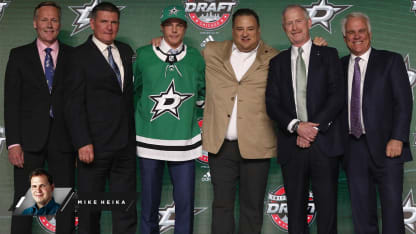Gathered in Buffalo last month, the Stars' scouting staff buzzed through 27 player interviews in three days and pored over analytics from physical testing.
But as important as that process is in preparing for the
2018 NHL Draft presented by adidas
at American Airlines Center Friday and Saturday, it was merely the conclusion to a hard year acquiring information on these young players. The real work is done on the road in small North American cities or far flung overseas locales.
"This is definitely helpful, but it's what you see during the season that's the most important," Joe McDonnell, the Stars director of amateur scouting, said at the scouting combine. "We want them to be hockey players, so we need to watch them playing hockey."
Heika: What is it like to be a scout for Stars?
From 'a lot of time on the road' to more than two dozen combine interviews, the job can be tough -- and rewarding

COMPLETE COVERAGE: [NHL Draft Central | Who will Stars select at No. 13 overall?]
The concept makes sense, but the process isn't easy. Most scouts cover a big geographical region, and most have to drive long distances to cover five to seven games a week in those regions. They do that driving in the middle of the winter in some pretty snowy places.
"It's part of the business," said Mark Leach, who worked for more than a decade in the Detroit Red Wings organization and came to the Stars in 2013 with McDonnell and GM Jim Nill. "You spend a lot of time on the road, a lot of time away from the family, but you have to do that to understand who the kids are, see what they might become."
Leach said the interviews and analytics enhance the old-fashioned scouting of seeing players in person. And while watching the athletes on the ice is the biggest part of the job, it's also important to be around the players and see how they interact with teammates, or learn more about their families.
"There's just so many things you can pick up by seeing them in person," Leach said. "You can find out how they react with their team, what kind of leader they are. You get to talk to coaches and parents. It's a huge part of it."
And a necessary part when you consider that the real trick to this scouting game is not reporting on the now, but understanding the future.
"It is a hard job, because you have to project who they will become," Leach said. "We're not going to see most of these kids in the NHL until they're 22 or 23, so what are they going to look like then? That really is the essence of what we do, and it takes time."
It also takes a great deal of patience. Scouts have to go on the road, scout their area, create their files and reports, and then bring that information back to the group. The NHL draft is seven rounds (
Dallas has eight picks this season
) and the Stars have 10 amateur scouts.
That means there are seasons when you put in all of the work and you don't get a player from your area selected.
"My first year scouting, I did not see anyone that we actually drafted, so I learned right off the bat how frustrating that can be," said Dennis Holland, who scouts Western North America. "You work and you work and you wonder if you're making a difference, but I realized what you do matters in the big picture. Sometimes, crossing guys off the list helps you make sure you're getting the right guy. It's a job where you have to have patience.
"Even when you draft a guy that you have scouted, you have to be patient. It's two years or four years or six years, they all develop at different rates. And then the team might make a trade, and you have to understand that's part of the process."
Holland, who joined the Stars in 2003, was in on a pretty important pick, so he also understands how his job can help change the destiny of the franchise. He helped bring attention to a raw prospect out of the British Columbia Junior Hockey League in 2007, and Jamie Benn was taken in the fifth round (129 overall) by the Stars that summer.
"I saw him before Christmas there, and he intrigued me," Holland said. "You look for things that will transfer to the NHL game, and it was his shot for me. He had an NHL shot, an NHL release. There was long way to go in strength and skating, but he had a great shot and that sent the radar up."
Les Jackson, the Stars senior advisor to the GM, always jokes that had they known Benn was going to be this good, they probably would have taken him earlier, but late-round gems like Benn show why scouting is important. The Stars haven't had a great record on first round picks over the past decade, with players like Scott Glennie, Jack Campbell and Jamie Oleksiak washing out of the organization, but they also have picked up Reilly Smith in the third round and Curtis McKenzie in the sixth round in 2009, John Klingberg in the fifth round in 2010, Esa Lindell in the third round and Gemel Smith in the fourth round in 2012, John Nyberg in the sixth round in 2014, and Colton Point in the fifth round in 2016.
Holland said being able to understand that a good project might be available later takes the work of being in the building watching on the road.
"He was a guy who wasn't being seen much. He was playing on (Vancouver Island) and not playing in a lot of the tournaments, so you can gauge the interest level," Holland said of other teams. "Les Jackson, Tim Bernhardt and I saw him late in the season and there was maybe one other scout there, so you have an idea how much competition you have."
That doesn't make the waiting any easier.
First, the scouts have to wait to see if their guy is going to be there when the Stars have a pick. Then, they have to wait to see if they develop into the player that's projected. Then, they have to wait to see if they stay with the organization or get moved on for any number of reasons. Jarome Iginla (11th overall in 1995) was one of the best picks the Stars have ever made, but he was traded to Calgary to get Joe Nieuwendyk, who helped the Stars win the 1999 Stanley Cup.
"It can be disappointing, but you learn to accept it, because it is going to happen," said Ontario scout Jimmy Johnston. "I think we all trust the process, that's why we have these meetings. But, yeah, you have to have a ton of patience in this job."
If you do, it can be a pretty rewarding profession.
"It's a sport that is played in snowy places in the dog days of winter, so I'm sure every scout has travel stories, but you find ways to work around things and you get good at anticipating problems," McDonnell said.
"It's not easy, but my wife always says I've never had a real job, because I drive around and watch hockey games, and they pay you to do that. That's pretty exciting when you get right down to it."
The center of the hockey universe will be in Texas on Friday and Saturday as the Stars host the 2018 NHL Draft™ presented by adidas for the first time ever at American Airlines Center. For complete Draft coverage, including the latest stories, videos and event information, click here.
This story was not subject to the approval of the National Hockey League or Dallas Stars Hockey Club.
Mike Heika is a Senior Staff Writer for DallasStars.com and has covered the Stars since 1994. Follow him on Twitter @MikeHeika.
Read more: 2018 NHL Draft, Dallas Stars


















